#calcium supplements products
Text
#dairy products near me#gir cow milk in Mumbai#a2 cow ghee#best a2 milk in Pune#calcium supplements products#ayurvedic immunity booster products#Aphra
0 notes
Text
Calcium Feed Supplements with Chelated Minerals are specially formulated nutritional products designed to provide animals with an optimal balance of calcium and essential minerals. These supplements are particularly beneficial in situations where animals have increased nutritional needs, such as during growth, pregnancy, lactation, or periods of high productivity.
Chelated minerals are minerals that are chemically bonded to an amino acid or organic compound, which enhances their bioavailability. In simpler terms, chelated minerals are more easily absorbed and utilized by the animal’s body compared to non-chelated (inorganic) forms. This increased absorption makes chelated minerals more effective in meeting the nutritional needs of animals.
#pcdfranchise#veterinarypcdpharmafranchise#veterinaryfranchisebusiness#calcium feed supplements#chelated minirals#veterinary medicine#veterinary product
0 notes
Text
#animal feed supplements#dairy farming equipment#animal accessories#Calcium Liquid for cow#Mineral mixture#animal feed products
0 notes
Text
ProDentim
Supplements
A Smile Saver: My Experience with ProDentim Supplements
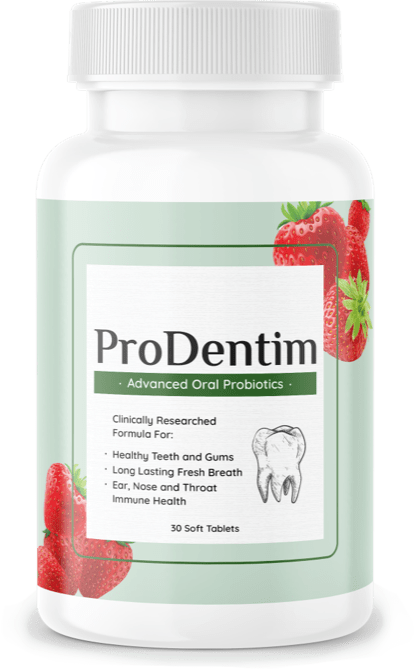
Brushing twice a day and flossing regularly are the cornerstones of good oral hygiene, but I'd always felt like I could be doing more for my teeth and gums. After a bit of research, I decided to try ProDentim supplements, and I'm thrilled I did!
A Natural Boost for My Smile
ProDentim is a dental health supplement that contains a blend of probiotic strains and other beneficial ingredients. Probiotics are live bacteria that can improve gut health, and recent research suggests they may also play a role in oral health. I was drawn to ProDentim's natural approach to supporting healthy teeth and gums.
Easy to Take and Gentle on the System
The ProDentim supplements come in easy-to-swallow capsules. I take one each morning with breakfast. They're flavourless and haven't caused any stomach upset, which is a plus for me as some supplements can be a bit harsh.
A Brighter, Fresher Smile
Since taking ProDentim, I've noticed a few positive changes in my oral health. My breath feels fresher throughout the day, and my gums seem less puffy and irritated. I'm also hoping that the probiotics in ProDentim will help to prevent future cavities and gum problems. It's still early days, but I'm definitely feeling more confident about my smile.
Would I Recommend ProDentim?
Absolutely! If you're looking for a natural way to support your oral health, I highly recommend giving ProDentim a try. It's easy to take, gentle on the system, and seems to be making a positive difference in my smile. It's important to note that I'm not a medical professional, so it's always a good idea to speak to yourdentist before starting any new supplements. But for me, ProDentim has been a great addition to my oral hygiene routine.
#ProDentim#Supplements#ProDentim supplement#Dental hygiene#Dental care#Super dental care#Healthy gum and teeth#Toothtonic#Briterteeth#Toothwhitener#Toothproduct#Best tooth product#artists on tumblr#michael cera#donald trump#Anticavities#Antipyrrhoea#Strong tooth#Strong teeth#Healthy teeth#Calcium for teeth#Minerals for teeth
0 notes
Text
PowerBite: Strengthening My Smile and My Recommendations
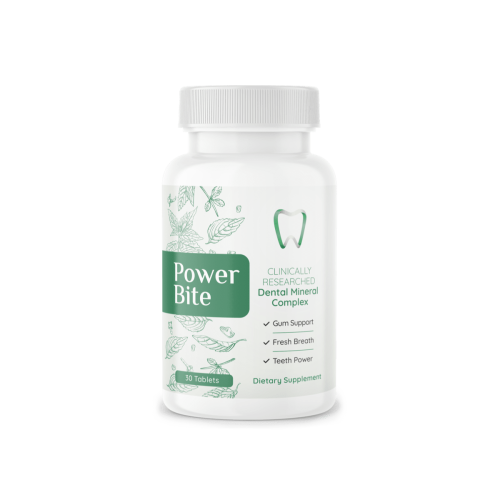
As someone who prioritizes oral health, I'm always on the lookout for innovative products that can support strong teeth and healthy gums. While I practice good oral hygiene and have regular dental checkups, I was intrigued by PowerBite, a dental supplement claiming to utilize "thermal calcium" for enhanced benefits. Here's my experience with PowerBite:
A Unique Approach to Calcium Supplementation
The concept of "thermal calcium" initially piqued my curiosity. PowerBite highlights a unique processing method that supposedly enhances calcium absorption. While I'm not a scientist, the explanation resonated with my desire to go beyond basic calcium supplements. After some online research on the potential benefits of this processing method, I decided to give PowerBite a try.
Improved Enamel Strength and Reduced Sensitivity
Since incorporating PowerBite into my routine, I've noticed a positive change in the overall strength of my teeth. My dentist even commented on a slight improvement in enamel health during my last checkup. Additionally, I used to experience occasional sensitivity to cold drinks. Thankfully, that discomfort has become a thing of the past since taking PowerBite. Whether due to the thermal calcium or the combination of ingredients, I'm happy with the results.
Fresh Breath and a Brighter Smile
Beyond the benefits for my teeth, PowerBite has also had a positive impact on my breath. The supplement contains additional ingredients known for their breath-freshening properties, and I've noticed a noticeable difference in overall freshness throughout the day. This bonus benefit, coupled with the potential for stronger teeth, makes PowerBite an attractive option for anyone seeking a well-rounded oral health solution.
Convenient and Easy to Integrate into My Routine
PowerBite comes in chewable tablet form, making it a convenient and pleasant addition to my daily routine. The tablets have a mild, minty flavour and are easy to take on the go. The recommended dosage is just two tablets a day, making it effortless to incorporate into my existing regimen.
A Valuable Addition to My Oral Health Routine
While maintaining good oral health requires a combination of factors, including brushing, flossing, and regular dental checkups, PowerBite has become a valuable addition to my routine. The unique "thermal calcium" approach, coupled with the additional breath-freshening ingredients, has demonstrably improved the strength, health, and overall comfort of my teeth. If you're looking for a convenient and potentially effective way to support your oral health, I highly recommend giving PowerBite a try. Remember, consulting with your dentist before starting any new supplement regimen is always a good idea.
0 notes
Text

💪 Discover the power of calcium supplements in our latest infographic! From stronger bones to a healthier heart, these tiny tablets are packed with benefits. #CalciumSupplements #HealthyBones #HeartHealth #Wellness #PMSRelief #StrongMuscles 💊🦴❤️
0 notes
Text
Looking for a natural source of calcium, potassium, and Vitamin B? Discover the power of Spirulina Capsules. Why wait? Buy now!
#Spirulina#Spirulina Capsules#Natural Supplements#Calcium Source#Potassium Benefits#Vitamin B Health#Nutritional Supplements#Wellness Products#Buy Spirulina
0 notes
Note
wait, are the health claims from bone broth bogus? (genuine/good faith question). i’ve always heard that it’s high in collagen, which supposedly is good for you and better if you get it ‘naturally’ like from bone broth. is that another thing that’s not actually true, or wildly exaggerated?
Bone broth has been eaten for centuries in various cultures because it is easy to digest and believed to have healing properties. Chicken broth is highly valued by some as a remedy for the flu. In more recent years it has been promoted to help symptoms from psychiatric and neurodevelopmental disorders including autism and attention-deficit hyperactivity. [7] Claims that it detoxifies the liver, improves digestion, reverses wrinkles, builds bones, and relieves join pain have led some marketing analysts to predict that the bone broth market will approach $3 billion by 2024. [8] In reality, bone broth contains only small amounts of minerals naturally found in bone including calcium, magnesium, potassium, iron, phosphorus, sodium, and copper. The amount of protein, obtained from the gelatin, varies from 5-10 grams per cup. There is some concern that bone broth contains toxic metals like lead. One small study found that bone broth made from chicken bones contained three times the lead as chicken broth made with the meat only. [7] However the amount of lead in the bone broth per serving was still less than half the amount permitted by the Environmental Protection Agency in drinking water. A different study found that bone broth, both homemade and commercially produced, contained low levels (<5% RDA) of calcium and magnesium as well as heavy metals like lead and cadmium. [9] The study noted that various factors can affect the amount of protein and minerals extracted in bone broth: the amount of acidity, cooking time, cooking temperature, and type of animal bone used. Therefore it is likely that the nutritional value of bone broths will vary widely.
(Source: https://nutritionsource.hsph.harvard.edu/collagen/)
Your body makes collagen; eating collagen will put the things that make collagen into your body to make collagen with, but so will eating things that go into making collagen (amino acids, basically).
There's not good evidence that eating a ton of collagen or supplementing collagen improves your body's collagen production, and studies on collagen supplementation tend to be done by companies that make collagen supplements or produce expensive bone broth.
Basically if you're eating the 9 essential amino acids by consuming complete proteins (which can be done on any kind of diet, vegan or vegetarian or including meat - this is NOT one of those things your body relies on animal products to produce) your body is going to make collagen and it's going to have the amino acids handy to make collagen; consuming more collagen may mean that your body has more of those collagen-forming amino acids on hand, but it doesn't mean that your body is going to be any more efficient at producing collagen (and your body is going to become less efficient at producing collagen as you age).
But yeah bone broth health claims are primarily bogus. If you want more collagen in your diet for whatever reason, it's probably about as effective to eat jello as it is to eat bone broth but also more collagen in your diet likely isn't doing anything special.
1K notes
·
View notes
Text
The Multi-Benefits of Bone Plus Supplements: Supporting Bone Health and Overall Wellness
Bone Plus supplements, which typically include calcium, vitamin D, and magnesium, can offer several benefits for maintaining and supporting bone health. These include:
Helping to prevent bone loss: Calcium and magnesium are essential minerals for maintaining strong and dense bones. A Bone Plus supplement can help to ensure that you are getting enough of these minerals to prevent bone loss and reduce the risk of osteoporosis.
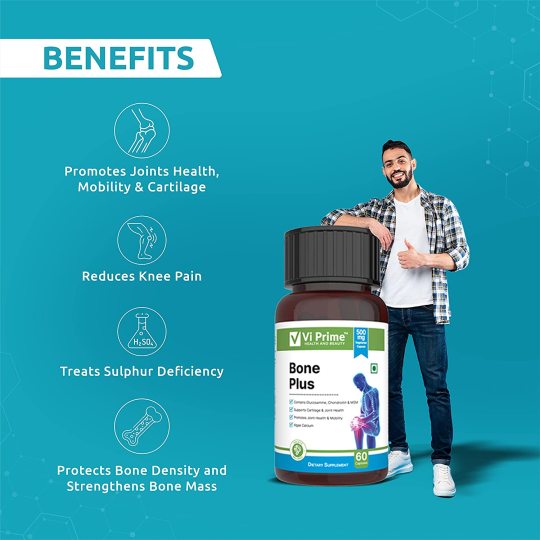
Improving calcium absorption: Vitamin D is important for the body's ability to absorb calcium. Taking a Bone Plus supplement that includes vitamin D can help to improve the absorption of calcium and ensure that it is being used to build and maintain strong bones.
Supporting bone health throughout life: Bone health is important throughout life, and a Bone Plus supplement can help to support bone health in all ages. It can be especially important for older adults, postmenopausal women, and people who have a high risk of osteoporosis.
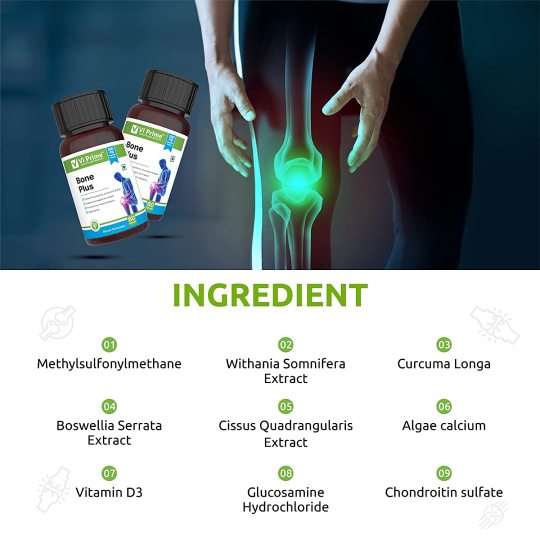
Improving overall health: Calcium, vitamin D, and magnesium also have other health benefits beyond just supporting bone health. Calcium and magnesium can support cardiovascular health and magnesium can improve sleep, reduce stress and anxiety. Vitamin D can also help to boost the immune system and protect against certain diseases.
It's important to note that taking a Bone Plus supplement should not be used as a replacement for a healthy diet and regular exercise, and it's always best to consult with a healthcare professional before starting any new supplement regimen.
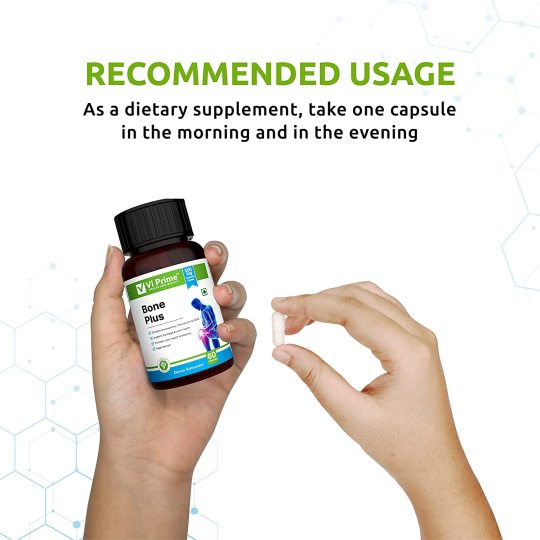
KEY INGREDIENTS: Vi Prime Bone plus contains Boswellia serrata. It is a resin from the Boswellia tree. It acts as a natural medication for inflammation. Its anti-inflammatory properties can assist with joint support
Bone Plus Calcium Capsules
Glucosamine chondroitin supplements
Ashwagandha supplement for sleep
Health Care Products
0 notes
Text
Aphra Provides Free Home Delivery of Dairy & Ayurvedic Products
Aphra offers Free Home Delivery of Best Dairy Products, Natural Ayurvedic Products, and seasonal fruits. For More Information visit our Official Website - www.aphra.in

#dairy products near me#gir cow milk in Mumbai#a2 cow ghee#best a2 milk in Pune#calcium supplements products#ayurvedic immunity booster products#Aphra
0 notes
Note
beginner guide to vitamins?
I am uneducated on vitamins and what they do for you, I only know the basics, however I did do research before posting. This is a disclaimer that I am not a doctor, and your general practitioner knows best for you. I made this into an everyday vitamin guide instead, as it is a lot more simpler for me and to avoid misinformation ❀
EVERYDAY GUIDE TO VITAMINS
About vitamins that best support you when consumed on a daily basis! I used food instead of supplements because of no specification.
VITAMIN A
Supports vision, a healthy immune system and cell growth.
Sweet potatoes, carrots, spinach, kale and liver.
Or, look for foods rich in beta-carotene.
B VITAMINS
Support many bodily functions and the proper development your body.
Whole grains, leafy greens, nuts or seeds and legumes.
VITAMIN C
Acts as an antioxidant, helps to heal wounds, supports the immune system and collagen production.
Citrus fruits like oranges, grapefruits or lemons. Strawberries, kiwi, bell peppers and broccoli.
VITAMIN D
Supports bone health, immune system and regulation of moods.
Fatty fish like salmon, mackerel, sardines. Diary products like milk, yoghurt and cheese.
VITAMIN E
Supports skin health and is anti-inflammatory.
Nuts and seeds, spinach and broccoli.
CALCIUM
Helps with muscle contraction, strong teeth and bones and nerve function.
Diary products like milk, yoghurt or cheese. Kale and spinach.
IRON
Supports healthy red blood cell production and energy levels.
Red meat, poultry, fish. Legumes, tofu and spinach.
OMEGA 3 FATTY ACIDS
Anti-inflammatory, support brain function and heart health.
Fatty fishes or seeds.
This post was a bit difficult, if mine wasn’t what you were looking for, here’s one that I would recommend.
#becoming that girl#that girl#glow up#glow up era#health is wealth#health and wellness#health#self healing#green juice girl#healthy eating#healthy living#healthy girl#wellness gir#wellness era
1K notes
·
View notes
Text
Foods You Can Eat Instead of Taking Vitamins and Supplements 🍎🥥🥦🥑🍌
Vitamin A: Carrots, sweet potatoes, spinach, kale.
B Vitamins: Whole grains, meat, eggs, nuts, legumes.
Vitamin B1 (Thiamine): Whole grains, legumes, nuts, pork, fortified cereals.
Vitamin B2 (Riboflavin): Dairy products, lean meats, almonds, leafy greens.
Vitamin B3 (Niacin): Poultry, fish, nuts, legumes, whole grains.
Vitamin B5 (Pantothenic Acid): Meat, poultry, eggs, avocado, whole grains.
B6: Chicken, turkey, fish, bananas, chickpeas.
Folate (Vitamin B9): Leafy greens, legumes, citrus fruits, fortified grains.
Vitamin B12: Animal products (meat, fish, dairy), fortified plant-based foods.
Vitamin C: Citrus fruits, strawberries, bell peppers.
Vitamin D: Fatty fish (salmon, mackerel), fortified dairy products, sunlight.
Vitamin E: Sunflower seeds, almonds, vegetable oils, nuts, spinach, broccoli.
Vitamin F (Essential Fatty Acids): Fatty fish, flaxseeds, chia seeds, walnuts.
Vitamin H (Biotin): Eggs, nuts, sweet potatoes, salmon, avocado.
Vitamin K: Leafy greens (kale, spinach), broccoli, Brussels sprouts.
Vitamin K2: Fermented foods (natto, cheese), animal products, leafy greens.
Vitamin L1 (Anthranilic Acid): Cruciferous vegetables (cabbage, cauliflower), legumes.
Vitamin P (Bioflavonoids): Citrus fruits, berries, onions, green tea.
Vitamin Q (Ubiquinone): Fatty fish, organ meats, spinach, cauliflower.
Vitamin T (L-carnitine): Red meat, poultry, fish, dairy products.
Vitamin U (S-Methylmethionine): Cabbage, broccoli, Brussels sprouts.
Betaine: Beets, spinach, whole grains, seafood.
Boron: Fruits (apples, pears), legumes, nuts, avocado.
Calcium: Dairy products, leafy greens (kale, collard greens), almonds.
Carnosine: Beef, poultry, fish.
Carnitine: Red meat, dairy products, fish.
Catechins: Green tea, black tea, dark chocolate.
Choline: Eggs, liver, beef, broccoli, soybeans.
Creatine: Red meat, fish, poultry.
Chromium: Broccoli, whole grains, nuts, brewer's yeast.
Chondroitin: Cartilage-rich foods (bone broth, connective tissue of meat).
Copper: Shellfish, nuts, seeds, organ meats, lentils.
Coenzyme Q10 (CoQ10): Fatty fish, organ meats, nuts, soybean oil.
Ellagic Acid: Berries (strawberries, raspberries), pomegranates.
Glucosinolates: Cruciferous vegetables (cabbage, broccoli, cauliflower).
Glucosamine: Shellfish (shrimp, crab), bone broth, animal connective tissues.
Glutamine: Dairy products, meat, poultry, cabbage.
Inositol: Citrus fruits, beans, nuts, whole grains.
Iodine: Seafood, iodized salt, dairy products.
Iron: Red meat, poultry, beans, lentils, spinach.
L-Theanine: Mushrooms, black tea, white tea, guayusa.
Lignans: Flaxseeds, whole grains, cruciferous vegetables.
Lutein and Zeaxanthin: Leafy greens (spinach, kale), corn, eggs.
Lycopene: Tomatoes, watermelon, pink grapefruit.
Magnesium: Spinach, nuts, seeds, whole grains, beans.
Manganese: Nuts, seeds, whole grains, leafy greens, tea.
Melatonin: Cherries, grapes, tomatoes.
Omega-3 fatty acids: Flaxseeds, chia seeds, walnuts, fatty fish.
PABA (Para-Aminobenzoic Acid): Whole grains, eggs, organ meats.
Pantothenic Acid (Vitamin B5): Meat, poultry, fish, whole grains, avocado
Pectin: Apples, citrus fruits, berries, pears.
Phosphorus: Dairy products, meat, poultry, fish, nuts.
Prebiotics: Garlic, onions, leeks, asparagus, bananas (unripe), oats, apples, barley, flaxseeds, seaweed.
Probiotics: Yogurt, kefir, fermented foods (sauerkraut, kimchi).
Potassium: Bananas, oranges, potatoes, spinach, yogurt.
Polyphenols: Berries, dark chocolate, red wine, tea.
Quercetin: Apples, onions, berries, citrus fruits.
Resveratrol: Red grapes, red wine, berries, peanuts.
Rutin: Buckwheat, citrus fruits, figs, apples.
Selenium: Brazil nuts, seafood, poultry, eggs.
Silica: Whole grains, oats, brown rice, leafy greens.
Sulforaphane: Cruciferous vegetables (broccoli, Brussels sprouts), cabbage.
Taurine: Meat, seafood, dairy products.
Theanine: Green tea, black tea, certain mushrooms.
Tyrosine: Meat, fish, dairy products, nuts, seeds.
Vanadium: Mushrooms, shellfish, dill, parsley, black pepper.
Zeatin: Whole grains, legumes, nuts, seeds.
Zinc: Oysters, beef, poultry, beans, nuts, whole grains.
#women health#health and wellness#healthy diet#healthy living#healthy lifestyle#womens health#health#health tips#wellness#levelupjourney#dream girl guide#dream girl tips#dream girl journey#health is wealth#clean girl aesthetic#clean girl#it girl#nutrition#supplements#organic#food#nutrients#healthyhabits#healthy life tips#self love journey#self love#dream life#dream girl
2K notes
·
View notes
Text
Electrolytes and why they're important especially when water f4st!ng:
Electrolytes are electrically charged minerals, such as sodium, potassium, calcium, magnesium, chloride, bicarbonate, and phosphate. They are involved in various physiological processes.
During a water f4st, the body can lose electrolytes through various means, such as urine, sweat, and even through breathing.
Without sufficient intake of electrolytes, the body may experience imbalances that can lead to various health issues including:
muscle cramps, dizziness, weakness, irregular heartbeats, and in severe cases, even life-threatening conditions such as de4th.
Here's a breakdown of each electrolyte and its role in the body:
Sodium (Na+):
Role: Sodium is the primary extracellular cation (positively charged ion) and plays a vital role in maintaining fluid balance and blood pressure. It is essential for nerve impulse transmission and muscle function.
Source: Commonly found in table salt (sodium chloride) and many processed foods.
Potassium (K+):
Role: Potassium is the primary intracellular cation. It helps regulate fluid balance, nerve impulses, muscle contractions (including the heart), and maintains proper cellular function.
Source: Found in various fruits and vegetables, such as bananas, oranges, potatoes, and spinach.
Calcium (Ca2+):
Role: Calcium is essential for maintaining strong bones and teeth. It also plays a key role in muscle contractions, nerve transmission, blood clotting, and cell signaling.
Source: Dairy products, leafy greens, nuts, and fortified non-dairy milk.
Magnesium (Mg2+):
Role: Magnesium is involved in hundreds of enzymatic reactions in the body, including energy production, protein synthesis, muscle and nerve function, and maintaining healthy bones.
Source: Found in nuts, seeds, whole grains, leafy greens, and legumes.
Chloride (Cl-):
Role: Chloride is the major extracellular anion (negatively charged ion) and works closely with sodium to help maintain fluid balance and osmotic pressure in cells.
Source: Commonly found in table salt (sodium chloride) and many processed foods.
Bicarbonate (HCO3-):
Role: Bicarbonate is involved in regulating the body's acid-base balance (pH level) and is a crucial component of the bicarbonate buffering system.
Source: The body produces bicarbonate as part of normal metabolic processes.
Phosphate (HPO42-):
Role: Phosphate is essential for bone and teeth mineralization, energy production (adenosine triphosphate, ATP), and serves as a component of DNA and RNA.
Source: Found in various foods, including meat, dairy products, nuts, and whole grains.
To prevent these complications and support the body during a water f4st, it is crucial to supplement with electrolytes.
Many people who practice prolonged water f4st!ng or intermittent f4st!ng find it helpful to take electrolyte supplements or consume electrolyte-rich drinks to ensure they maintain proper mineral balance throughout the f4!sting period. However, it is essential to consult with a healthcare professional before starting any regimen or supplement routine, as individual needs may vary.
#making a list of signs/symptoms of low electrolytes next#ed not ed sheeran#ed not sheeren#ed no sheeran#disordered eating thoughts#tw ana shit#tw ed diet#ed bllog#anorex14#ana trigger#ana shit#tw ana diary#4norexi4#thin$spo#thinspø#th!n$spo#⭐ving#⭐ve#tw ed rant#ed vent
2K notes
·
View notes
Text
there's surprisingly very little about clones that is determined by genetics. height, weight, fat/muscle distribution, stamina, and some aspects of mental fortitude definitely are, but a common flaw is for one to believe that anything a clone does or doesn't do, or thinks or doesn't think, is the direct result of genetic tampering. little to nothing is credited to the powerful force of upbringing. nurture. culture. ideology.
as a general rule of thumb, clones don't like fish. this isn't because there's a set of taste bud genes that the Kaminoans played around with, and it doesn't stem from Jango in particular. the clones don't like fish because they didn't grow up eating it, and they didn't grow up eating it (it is theorized, at least) because the Kaminoans themselves are vegetarian and eat a lot of seaweed. THIS is because the catastrophic event that wiped out most of their species also destroyed many of the prey they naturally fed on, forcing the remaining Kaminoans to subsist on more plant matter than they used to.
this is an example of unintended Kaminoan lifestyle influence on the clone's lives and interests. While the Kaminoan scientists most certainly brought in expert nutritionists, whoever was primarily in charge of building the menu would not have thought to add fish or fish products to the menu. this is the same reason why the majority of older generations of clones are lactose intolerant to some degree. Not only was Jango lacking the crucial gene, the Kaminoans would not have thought to supplement the clones' diet with dairy products because they themselves cannot digest it and the human species, while mammalian, gets weaned at about one and a half years old. That is the plan the Kaminoans followed. There are other, stronger sources of calcium that the Kaminoans put into the clones' diet to ensure proper bone development.
(in fact, the majority of clones' food was supplemented with nutritional additives rather than the nutrients being part of the meal itself, initially. Their diets are so strictly controlled that the Kaminoans would rather give the clones dried fruit flavored fiber sticks than fresh fruit. Fresh fruit was rare.)
Multiple things got more dairy and a wider variety of foods in general into the clones' diet:
Bounty Hunter and Drill Sergeant influence.
They brought parts of their cultures or personal influences to Kamino. They had special orders of the things they enjoyed, including icecreams, snacks, cheeses, etc. The "nicer" instructors would sometimes let a clone they liked sample a piece of food. This is also how it was discovered that every single clone was deathly allergic to the space version of a cashew nut (a flaw swiftly handled by the scientists via both allergen therapy shots for already-born clones and a change to the standard clone template).
2. Returning clone influence.
Clones coming back from deployment brought a plethora of goodies (illicit and not) with them. Foods, snacks, candies, miscellaneous ingredients, stories of what amazing meals could be had if you were savvy enough or adventurous enough lucky enough. There are rumors of a GAR galactic candy trading system that stretches all the way back to Kamino, though evidence of it is sparse. Even Captain Rex is reported to have brought back gummy worms when called to Kamino to give a training lecture to rising CCs. Though the bag was allegedly "family sized", it is unclear if the goods were actually shared.
3. Experimentation.
[This is actually canon lol] The Kaminoans found that clones were more enthusiastic about mealtimes and getting their calories in when the food actually tasted good and had more variety. Taking the previous two influences, the clones' diet on Kamino improved in both taste and texture -- but there's still no fish.
#ch posts#star wars#the clone wars#captain rex#fives#all the bros#clone wars#tcw#star wars the clone wars#swtcw#commander wolffe#commander cody#clone culture#star wars meta#kamino#headcanon#clone trooper#meta
116 notes
·
View notes
Text
My lovely friends, this is a friendly evidence-based post pertaining to the risk reduction of a few well-known health effects of 4n4 and mia. Including: Amenorrhea (loss of regular menstrual period), anaemia, digestive upset, dehydration, electrolyte imbalance, general well-being, and osteoporosis. It is quite a long post, but please let me know if there’s any other information you would like me to cover. 💕
🪐 Vitamins and Supplements:
• A-Z Multivitamin. Is beneficial for supplementation. For example, Vitamin C is a vitally important vitamin for the body’s connective tissues, including the maintenance of healthy bones and teeth, cellular formation and maturation, resistance to infection, and an increased ability to heal. Additionally, B12 contributes to an adequately functioning nervous system, bone marrow, and intestinal tract. It also acts to increase metabolism of protein, carbohydrates, and fats. Finally vitamin B2 when combined with Vitamin A promotes good vision and healthy skin, as well as assists in metabolising proteins and fats at a cellular level.
• Calcium and Vitamin D. Seek a preparation which offers 1000mg of calcium and 10-20mcg (400-800 iu) of vitamin D. Vitamin D increases the bodies efficacy during the absorption, retention, and metabolising of calcium. Calcium of course being vital for bone integrity and imperative for the prevention of osteopenia/osteoporosis.
• Iron. An appropriate iron intake will restore the functionality of red blood cells, allowing the proper oxygen transportation around the body, increase focus, energy, athletic performance, and sleep. Having a sufficient iron store will alleviate some commonly experienced symptoms of low iron including fatigue, dizziness, pallor, and shortness of breath. It may also reduce the sensation of cold hands and feet.
• Potassium and Zinc. A lack of zinc impairs the ability to smell and taste. Connecting this impairment to nose blindness. For example, a lack of a sense of smell and taste may impair one’s own ability to detect their own bad breath, BO, and other unpleasant smells that others may be able to detect.
• Omega 3’s - Fish oil, Krill oil, Hemp oil, or Flaxseed oil. Improper dietary intake, or supplementation of omega 3 fatty acids will result in areas of epidermal (skin) dryness, hyperkeratosis, and hyperpigmentation. As well as the formation large scales expose underlying tissue, which are easily infected. The hair becomes sparse, dry, lusterless, and brittle, with a reddish tinge. Furthermore, nails become brittle and dull, tear production reduces, the tears are also significantly less oily leading to increased evaporation contributing to chronically dry, red, and itchy eyes.
If oil supplements are scary for you to intake due to calorie fears (there is only approx 25 calories in 2 average fish oil capsules). There are dietary sources of omega 3 that are relatively low calorie including chia seeds, edamame, and seaweed. However they provide little amounts in comparison to supplementation or traditional dietary sources such as fish, avocado, oils etc.
However this should also be considered when deciding whether to supplement omega 3’s - they stimulate the secretion of leptin, a hormone that decreases appetite and promotes the burning of fat. Through the enabling of conversion of dietary fats into body cells for burning as fuel.
🍄 Dietary Intake
•Bone broth (or vegetable broth if meat is not apart of your diet ☺️) I cannot stress how great bone broth is! Extremely low calorie, but incredibly nutrient-dense. It also acts to decrease the inflammation within the gut that many of us will experience due to our dietary habits. Including conditions such as constipation, gastroparesis, liver disease, bloating, abdominal pain, and stomach ulceration.
Bone broth also contains large amounts of protein, collagen, iron, vitamins A and K, fatty acids, selenium, zinc, and manganese. Protein being the most satiating macronutrient can decrease hunger and associated discomfort. Collagen and the variety of micronutrients within the bone broth contributes to joint and bone health. Bone broth will also contribute to hydration.
•Nutrient-dense foods including blueberries l are among the best sources of anthocyanins (antioxidants) that promote brain health and reduce the risk of cognitive decline. Additionally, red tomatoes and red capsicum (Peppers). Tomatoes are the richest source of lycopene, which is a type of carotenoid found in red fruits that has powerful antioxidant effect that may help protect against heart disease and certain types of cancer.
•Fibre is imperative for smooth gastrointestinal function, including regular bowel movements. Fibre is of course typically found in whole fruits and vegetables, beans/lentils, and whole grains. Low calorie fibre sources include: red kidney beans, carrot, and chickpeas. Psyllium, chia seeds are also good sources of fibre. Fibre supplants such as Metamucil may also aid to increase fibre intake. An adequate intake of fibre may reduce the dependence of laxative for bowel movements. Prolonged use of laxatives may create a dependency on them to even have a bowel movement.
🥥 Adequate Hydration
• The best way to ensure adequate hydration is simply by consuming enough water during the day. However, if plain water consumption is difficult, fluid intake will also suffice. Including fluid such as teas, flavoured/enhanced water, diet soft drinks, juices, etc. The optimal fluids to consume in addition to, or instead of simple water to ensure adequate hydration is mineral water, coconut water, or diet electrolyte replacements (Powerade/Gatorade, Pedialyte, Hydralyte). Correct hydration and electrolyte intake will reduce headaches, constipation, and muscle cramps/weakness.
❤️ Reproductive Health
•Amenorrhea is a common experience for those of us with a uterus. However it is imperative to understand that you are more than likely still ovulating despite the lack of a regular menstrual period. Therefore, contraception must still be used. Amenorrhea may be alleviated through dietary supplementation and small changes to the diet to include more micronutrients, but it may not be completely fixed unless there is an increase to body fat percentages.
#fitblr#ed not ed sheeran#ed#edblr#edtwt#ed tmblr#ed bullshit#anorex14#tw ana shit#ana and mia#tw mia#ana e mia#tw ed diet#meanspø#grossp0#fitspiration#notprojustusingthetags#4norexi4#4n4#4n4blr#4norexia
189 notes
·
View notes
Text
JRWI characters react to your lactose intolerance.
Gillion: What's lactose intolerance???? *DRINKS A GALLON OF MILK AND PROCEEDS TO HAVE SEVERE STOMACH ISSUES*
Jay: Wow it must suck to be you *continues to drink her glass of milk without a care*
Chip: HAH!! *tries to drink milk but it drips out his exposed ribcage* Awe man.........
Goobleck: it okay!! goobleck drink it all already!!!!!
Vyncent: I know how to fix this!!! *dashes over to the sink and pours all the milk down the drain*
William: oh ill just put this away then *goes to walk to the fridge but phases through the floor leaving only the bottle of milk behind*
Dakota: OH NICE I PREFER SOY MILK ANYWAYS IT TASTES SO GOOD, RIGHT??
Ashe; *hands you a can of monster*
Rand: *takes deep inhale of joint and exhales* did you know theyre puttingillegal supplements in milk its this whole conspiracy--
Kian: its okay dude but like where do you get your calcium from then..?
Rolan: Coffee doesn't even taste that good so you're not missing out.
Thanatos: Your biases towards dairy products does not concern me Y/N.
peter; oh wow me too...... we're like. both so intolerant... ..i think i phrased that wrong. nevermind.
rumi: Hm. I see... Did you know some people are into that sort of thing? You know, milking? Not me of course. But.
Exandrofh: I'M INTOLERANT TOWARDS MILK TOO I EXPLODE EVERY COW I SEE
#📚 my posts#💬 inc quotes#just roll with it#jrwi riptide#jrwi prime defenders#jrwi blood in the bayou#jrwi apotheosis
100 notes
·
View notes